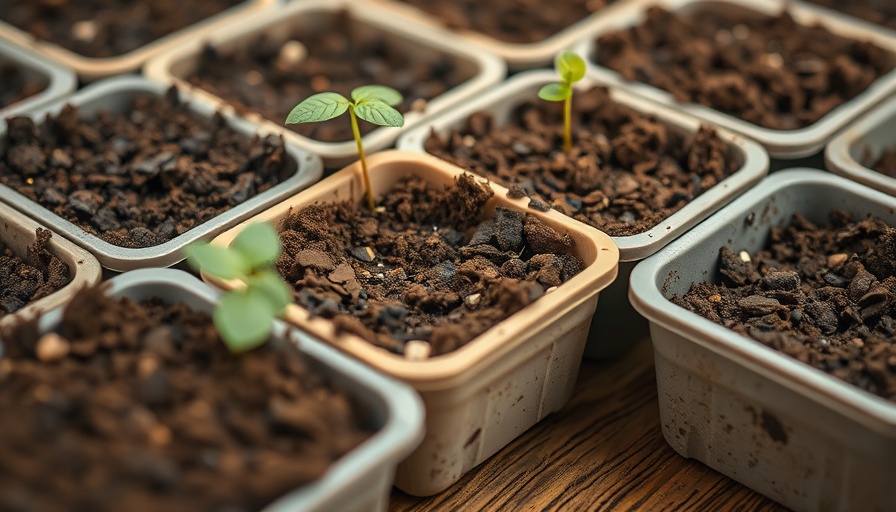
Understanding Seed Germination: The Crucial Role of Temperature
For anyone who’s dabbled in gardening, from the novice with a few potted plants to the seasoned green thumb managing an expansive plot, the process of seed germination is both an exciting and crucial step toward growing vibrant plants. A key factor in successful seed germination is temperature, as most seeds flourish best in warm soil. Understanding why and how to create the ideal conditions for your seeds can elevate your gardening experience and yield healthier plants.
In "Seed Starting 101: Importance of Temperature," the discussion dives into the critical temperature requirements necessary for successful seed germination. By recognizing the importance of warm soil, we are equipped with insights that can elevate our gardening practices.
Why Warm Soil Matters
The ideal soil temperature for germinating most seeds ordinarily falls between 70 to 75° F (21 to 24° C). This range allows seeds to absorb moisture efficiently and activate enzymes essential for growth. When seeds are placed in cooler soil, they may remain dormant longer than necessary, leading to delayed growth and potential challenges in the seedling's early development.
Utilizing Heat Mats for Optimal Germination
One key method to maintain the right soil temperature is the use of a heat mat. These mats provide consistent, even warmth that enhances the germination process. By ensuring that the temperature remains in that sweet spot, your seeds can sprout faster and more vigorously than they would otherwise. A successful start can lead to robust plants throughout the growing season.
Signs Your Seeds are Properly Germinated
Once your seedlings emerge from the soil, you can remove the heat mat, as the nutritional value they need should be increasingly accessible through their roots after germination. Look for two primary indicators of successful germination: the emergence of green shoots and the formation of true leaves. These signs indicate that your plants are ready for the next stages of growth.
The Journey from Seed to Seedling: A Timeline
Gardeners can expect varying timelines for germination depending on the types of seeds planted. While some seeds may sprout within a few days, others might take weeks. For example, fast-growing seeds like radishes may take as little as four to six days, whereas larger seeds like pumpkins can take up to two weeks. Monitoring soil temperature during this time is essential as it impacts the germination speed.
The Benefits of Optimal Seed Starting Conditions
Providing the right temperature not only speeds up germination but also supports stronger seedlings. Stronger seedlings result in healthier plants capable of withstanding pests and diseases better than those which have been started in less-than-ideal conditions. This knowledge transforms your gardening approach from guesswork to a more scientific and predictable practice.
Future Predictions: Gardening Techniques Evolving with Innovation
As the gardening community continues to grow, sustainable practices are becoming increasingly important. Heat mats are just the beginning; new technologies and environmentally friendly practices are enhancing how we approach the seed starting process. Innovations in soil temperature monitoring and control offer gardeners real-time data, ensuring that seeds receive optimal conditions and reducing common pitfalls of traditional gardening.
Embracing the Garden: A Connection to Mindfulness and Sustainability
Gardening has transformed from a simple hobby to a larger movement focused on sustainability and well-being. As individuals become more aware of their environmental impact, growing your own food—starting with seeds—provides a direct link to a sustainable lifestyle. This connection can be incredibly impactful, offering not just delicious fruits and vegetables but also the satisfaction of nurturing life from the ground up.
In the video titled "Seed Starting 101: Importance of Temperature," the discussion dives into the critical temperature requirements necessary for successful seed germination. By recognizing the importance of warm soil, we are equipped with insights that can elevate our gardening practices.
Conclusion: A Call to Nurture Your Garden
With the right knowledge and tools, anyone can create a thriving garden. Understanding the temperature needs for seed germination is fundamental for success. Start your journey today by investing in a good heat mat, monitoring soil temperatures, and watching your garden flourish. Happy gardening!
 Add Row
Add Row  Add
Add 




Write A Comment